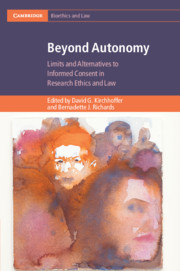Book contents
- Beyond Autonomy
- Cambridge Bioethics and Law
- Beyond Autonomy
- Copyright page
- Contents
- Tables
- Contributors
- Acknowledgements
- Introduction
- Part I Exploring Problems of Respect for Autonomy in Bioethics, Law and Society
- Part II The Search for Alternative or Complementary Concepts Surrounding Autonomy
- 5 Self-Ownership in Research Ethics
- 6 Beneficence in Research Ethics
- 7 Dignity, Being and Becoming in Research Ethics
- 8 Virtues in Research Ethics
- Part III Beyond Autonomy: Turning to the Community to Protect the Individual
- Index
- Books in the Series
7 - Dignity, Being and Becoming in Research Ethics
from Part II - The Search for Alternative or Complementary Concepts Surrounding Autonomy
Published online by Cambridge University Press: 20 September 2019
- Beyond Autonomy
- Cambridge Bioethics and Law
- Beyond Autonomy
- Copyright page
- Contents
- Tables
- Contributors
- Acknowledgements
- Introduction
- Part I Exploring Problems of Respect for Autonomy in Bioethics, Law and Society
- Part II The Search for Alternative or Complementary Concepts Surrounding Autonomy
- 5 Self-Ownership in Research Ethics
- 6 Beneficence in Research Ethics
- 7 Dignity, Being and Becoming in Research Ethics
- 8 Virtues in Research Ethics
- Part III Beyond Autonomy: Turning to the Community to Protect the Individual
- Index
- Books in the Series
Summary
Since the end of World War II, most guidelines governing human research seem to have relied on the principle of respect for autonomy as a key, though not sole, criterion in assessing the moral validity of research involving human participants.1 One explanation for this apparent reliance on respect for autonomy may be that respect for autonomy, made effective through the practice of obtaining informed consent, functions as a useful proxy when dealing with competent adults for the more complex principle of respect for human dignity that underpins much of the moral discourse in this area. If this explanation holds, then assessment of the moral licitness of research involving human individuals whose autonomy is limited in some way requires a deeper analysis of the ‘thicker’ concepts of human dignity, since we cannot rely on respect for autonomy to do the work of respect for human dignity where autonomy (understood as a capacity to consent based on adequate information) is not present, is limited or is compromised.
- Type
- Chapter
- Information
- Beyond AutonomyLimits and Alternatives to Informed Consent in Research Ethics and Law, pp. 117 - 132Publisher: Cambridge University PressPrint publication year: 2019

